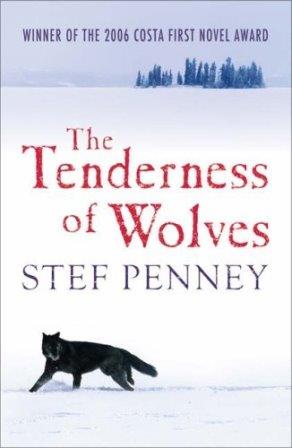
I love curling up with a good book, whatever the season.
You might find me on a sun lounger in summer or on a park bench in Autumn, but you’ll never find me without a book in my hand and another in my bag. (You never know when you’ll get Bonus Reading Time.)
In Winter I particularly enjoy snuggling up with books which have a properly cold setting. Recently this has included fantastic stories set in the Arctic Circle (‘The One Memory of Flora Banks’), Antartica (‘Devour’), Communist East Germany (‘Stasi Child’ and ‘Stasi Wolf’ – this cold may be more metaphorical but look at those covers) and Canada – ‘The Tenderness of Wolves’.
What’s it about?
When a man is found brutally murdered and a seventeen year old boy goes missing, the boy’s mother decides to find him in order to clear his name.
Their life in an 1860’s frontiership town has always been tough, but the forest is a foreign and frightening place, and winter is closing in… Can Mrs Ross find her son before the Company hunters can? What exactly was his connection to the dead trapper? And can investigating this new mystery help resolve a decades old one?
Typical quotes:
‘She considers herself a well-traveled woman, and from each place she has been to, she has brought away a prejudice as a souvenir.’
‘And so while my husband sleeps upstairs – we pack and I prepare to go into the wilderness with a suspected killer. What’s worse, a man I haven’t been properly introduced to.’
What’s it like?
Slow paced. Lovely to read (the writing is beautiful). Deliciously evocative of life in the Canadian wilderness.
There’s a panoramic quality to the writing which meant I wasn’t surprised to learn that debut novelist Steph Penney had written and directed two films prior to writing this novel.
This is a mixture of genres – a dose of romance, a tale of life in the wilderness, a dash of mystery and more than a hint of Canadian Western. The resulting story does feel a little lacking in focus at times: a key plot device is finally reduced to little more than a MacGuffin, and whole characters have fully fleshed out storylines that are ultimately almost irrelevant to the main narrative thread (yes I mean you, Line, and you, entire population of Himmelvanger).
One of the many strengths of Penney’s book is her evocation of place. The setting – especially the increasing coldness – is firmly felt throughout:
‘The cold is like a hand that is laid with gentle but implacable force on the snow, telling it to stay.’
Final thoughts
Ultimately, Penney captures the daily rigour of life on the seventeenth century Canadian frontier by following the threads of disparate lives – where they’ve been, where they wanted to go, where they may yet go.
There’s a certain sadness to all the endings which is wonderfully realistic without being too brutal. Not all the loose ends are tied up, but the central mystery is resolved. I found the conclusion of Mrs Ross’ story particularly moving.
This book was such a resounding success with my entire book group – a rarity! – that no-one even noticed the occasionally rather modern dialogue:
“Geez. Keep a girl waiting, why don’t you.”
“Sorry. Um… it’s just that, I’ll have to speak to my Dad, to see if he wants me to work….first. Thanks though. It sounds nice.”
To be fair to Penney, only the younger characters speak this way, so in that sense the dialogue is perfectly appropriate, which may be why such anachronisms passed by seasoned readers without comment.
In fact my best efforts to stir up debate and dissension resulted in increasingly positive commentary from the entire group. And I was only drawing their attention to possible flaws in an effort to widen the scope of the discussion: I’d thoroughly enjoyed reading ‘The Tenderness of Wolves’ too.
(Note to self: seek out a batch of Steph Penney’s second novel, ‘The Invisible Ones’, to see if it is possible to repeat this possibly unprecedented success.)
A gentle, delightful tale of harsh lives and harsher weather, wolves, furs, taboos, and the madness that is born of loneliness.
Recommended.


